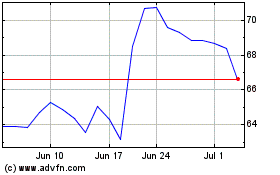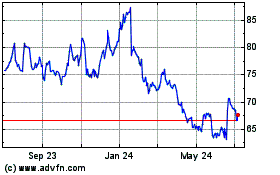By Jonathan D. Rockoff
Gilead Sciences Inc. has agreed to pay about $11 billion for
Kite Pharma Inc. and its promising new technology for harnessing
the body's immune system to fight cancer.
Gilead will pay $180 a share, representing a 29% premium over
Kite's closing price Friday. The all-cash deal would give Gilead a
foothold in a new type of personalized treatment that doctors say
could save patients with the most dire cases of cancer and analysts
estimate would ring up billions of dollars in sales.
Shares in Kite rose nearly 29% to $179 in premarket trading. The
Wall Street Journal reported earlier Monday about Gilead's deal to
buy Kite.
Gilead, of Foster City, Calif., had been looking for an
acquisition to diversify its portfolio beyond its leading position
in infectious-disease treatments and provide a new revenue stream
as sales of the company's hepatitis C drugs decline.
The deal for Kite would be one of Gilead's biggest, rivaling the
company's $11 billion purchase of liver-disease drugmaker
Pharmasset in 2012. Through that acquisition, Gilead gained
hepatitis C therapies that are among the world's top-selling
drugs.
Now Gilead is betting that Kite can provide a similar payoff.
Kite, of Santa Monica, Calif., is a leader among several companies
that aim to use genetic engineering to weaponize a patient's own
immune T cells and then deploy them to attack lymphoma and other
blood cancers.
Kite's main drug, known as axi-cel, is up for approval in the
U.S. and Europe. Analysts predict it would have world-wide sales of
$1.7 billion in 2022, according to EvaluatePharma, which ranks the
drug among the industry's top 10 compounds in terms of sales
potential. Such expectations have already pushed the company's
shares sharply higher this year.
"This technology is really going to be transformative to the
field," Gilead CEO John Milligan said in an interview.
Axi-cel is likely to face swift, steep competition. Novartis AG,
one of the leading cancer-drug makers, beat Kite to be the first
company to ask the Food and Drug Administration to approve a
bioengineered T-cell drug. Several other companies are developing
the drugs too.
Dr. Milligan said Gilead is accustomed to operating in
competitive drug markets. He said Kite's technology could be used
beyond its initial focus on an advanced form of lymphoma to other
blood cancers including multiple myeloma and perhaps in combination
with other immunotherapies.
Some of the drugs various companies were working on have
produced serious, even deadly, side effects during development. Dr.
Milligan said doctors have learned how cut the risk of side
effects, and Gilead and Kite would work on developing improved
treatments.
Gilead made its name selling treatments for HIV/AIDS. The
biotech company surged in value after launching the hepatitis C
treatments developed at Pharmasset. The drugs, Sovaldi and Harvoni,
helped Gilead double its sales in 2014. It now has a market value
of roughly $100 billion.
Last year Gilead had $30 billion in sales, including $9.1
billion from Harvoni and $4 billion from Sovaldi.
Yet the anti-viral drugs' commercial success has also proved to
be an albatross. Gilead faced public criticism and a Senate
investigation for listing Sovaldi at $1,000 a day, even though the
therapy cured most patients at a cost of less than a liver
transplant.
The hepatitis C drugs' sales were squeezed in recent years when
Merck & Co. launched a rival treatment, forcing Gilead to offer
steep discounts to health plans. And partly because of the drugs'
success curing the disease, fewer patients needed treatment.
The company's second-quarter hepatitis C drug sales fell to $2.9
billion world-wide, down from $4 billion during the period a year
earlier.
Gilead has faced pressure from investors and analysts to find
new revenue sources. Management responded by touting its next
generation of HIV/AIDS treatments as well as drugs in development
to treat a liver disease known as NASH, for nonalcoholic
steatohepatitis.
But Wall Street said Gilead needed to do another deal. Gilead
fanned speculation by hiring Alessandro Riva from Novartis to run
its hematology and oncology division, as well as its former
adviser, investment banker Andrew Dickinson, from Lazard.
After years of surging volume, pharmaceutical deal making has
been slow this year, with very few megamergers aside from Johnson
& Johnson's r oughly $30 billion deal to buy Actelion Ltd. Drug
companies have been digesting earlier acquisitions and have also
been hampered by uncertainty surrounding tax reform because many of
them have large amounts of cash overseas.
Dr. Milligan said Gilead had been eyeing Kite for months and
decided to make a move after Kite asked the FDA to approve axi-cel
and Gilead watched the performance of drugs from Novartis and
others.
Deal talks began in earnest during a dinner in June at the home
of Kite CEO Arie Belldegrun overlooking the University of
California, Los Angeles, campus where he also teaches and practices
medicine.
Dr. Milligan said Gilead realized the deal comprised not only
axi-cel but the technology for developing other cell-therapy cancer
drugs. "We see it as a nice, sustainable oncology platform for
decades to come," he said.
The deal is expected to close in the fourth quarter, around the
same time as the deadline for U.S. approval of Kite's main
drug.
Dr. Milligan said Dr. Belldegrun would help with the transition
to new ownership and that Gilead would retain "nearly all" Kite's
employees.
--Dana Mattioli contributed to this article.
Write to Jonathan D. Rockoff at Jonathan.Rockoff@wsj.com
(END) Dow Jones Newswires
August 28, 2017 08:31 ET (12:31 GMT)
Copyright (c) 2017 Dow Jones & Company, Inc.
Gilead Sciences (NASDAQ:GILD)
Historical Stock Chart
From Mar 2024 to Apr 2024

Gilead Sciences (NASDAQ:GILD)
Historical Stock Chart
From Apr 2023 to Apr 2024
